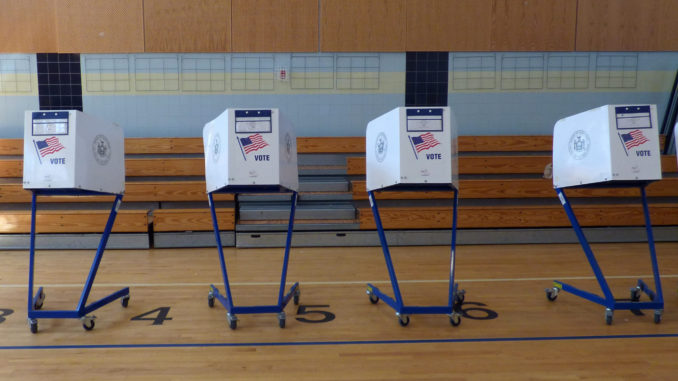
By Miriam B
It’s hard not to laugh. Fifteen candidates will be on the ballot in the nonpartisan special election for New York City Public Advocate on Feb. 26. In addition to current and former members of the City Council and State Assembly seeking higher office, grassroots activists have jumped at the chance to run for something. More than 15 other candidates, including most of the grassroots candidates, filed to run in the special election, but either failed to get enough petition signatures or were knocked off for failure to meet all the persnickety requirements in New York election law.
The 8-to-1 match for donations under $250 in New York City’s public campaign finance system made it feasible for grassroots candidates, as well as seasoned politicians, to run for office. That’s great. DSA supports keeping big money out of politics and allowing candidates without big bucks to run. NYC-DSA has joined the Fair Elections Campaign, which is trying to get New York State to adopt a public finance system like the City system, and other campaign finance reforms.
But it’s ludicrous to have so many candidates run in a “first-past-the-post’ election, where voters select just one candidate for each office, and the candidate with the most votes wins. The winner is highly likely to get less than majority support—and theoretically could garner as little as 7%.
Typically, when no candidate in a citywide election gets more than 40%, a runoff election is held. There’s won’t be a runoff for this special election, to fill the vacancy left by Letitia James election to state Attorney General. Instead, the winner will hold the office until year end, and party primaries in June and a general election in November will select the candidate to fill the position for the last two years of the four-year term. The Democratic primary is likely to attract several candidates in addition to the winner of the special election, so it’s possible there will be a runoff in September. That’s four elections in a year for a single office with relatively little power!
Ranked Choice Voting
City Councilmember Brad Lander has proposed amending the city charter to replace our first-past-the-post system with ranked choice voting (RCV), which allows voters to rank candidates in order of preference. DSA uses one kind of RCV in our internal elections. Lander is proposing another kind, sometimes called Instant Runoff Voting. In this system, if no candidate gets 50% of the first-choice votes, the candidate who receives the fewest first-choice votes is eliminated, and the system allocates the ballots for that candidate to the second-choice candidates on them. The process is repeated until one candidate gets 50% of the votes (See Lander’s video explainer).
RCV is already being used in Maine, Minneapolis, San Francisco, and Australia to avoid the need for expensive, separate run-off elections, and encourage more people to run. As important, RCV tends to elect candidates with broader support than a first past-the-post election, which generally favors people with intense support.
The results of first-past-the post elections can be perverse if two or more candidates split a broad pool of voters. For example, in the special election for Public Advocate, one of the two or three Republicans could win because the many Democrats running could split the vote among them. Or, one of the more mainstream Democrats could win because the three DSA members left in the race —Jumaane Williams, Nomiki Konst, and Ari Espinal—and the progressive candidates split the center/left vote. (DSA didn’t make an endorsement.)
RCV would eliminate the danger of vote splitting in special elections, party primaries, and general elections alike. In general elections, RCV would free us to run candidates on a socialist line, if we chose, without worrying that we’d split the center/left vote with the Democrat in the race, resulting in a conservative Republican win.
Voting Rights on the Agenda
It seems democracy is breaking out all over. RCV may be one of the three City Council-submitted proposals to amend the city charter on the ballot in November. Meanwhile, the new Democratic majority in the House of Representatives started the year with democracy reforms that the Senate won’t take up, while the state government finally adopted several reforms blocked for years when Republicans controlled the state Senate.
In January, both houses of the state Legislature passed and the Governor signed four changes to state election law that make voting easier: consolidation of state primaries on the same day as federal primaries; nine days of early voting (starting this November); portability of voter registration across the state, and pre-registration for 16- and 17-year-olds. In addition, they closed the limited liability corporation (LLC) loophole for campaign contributions. The Legislature also approved two amendments to the state constitution (same-day registration and no-excuse voting by absentee ballot). If it approves them again next year, these amendments will go to a voter referendum in November 2020.
The voting rights coalition pushing these measures aims to win passage of a few other laws this year: automatic voter registration, restoration of voting rights to formerly incarcerated people, flexibility to change party registration in much less than the 10 months before an election now required. and easier-to-read ballots. RCV is among the many goals for future years. So is elimination of the persnickety details that trip up many candidates.
NYC-DSA’s Citywide Electoral Working Group has recently begun work on both election law and campaign finance reform. The next meeting of the election reform committee is Feb. 2. Sign up here to attend the meeting or get involved.
